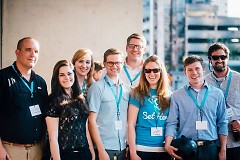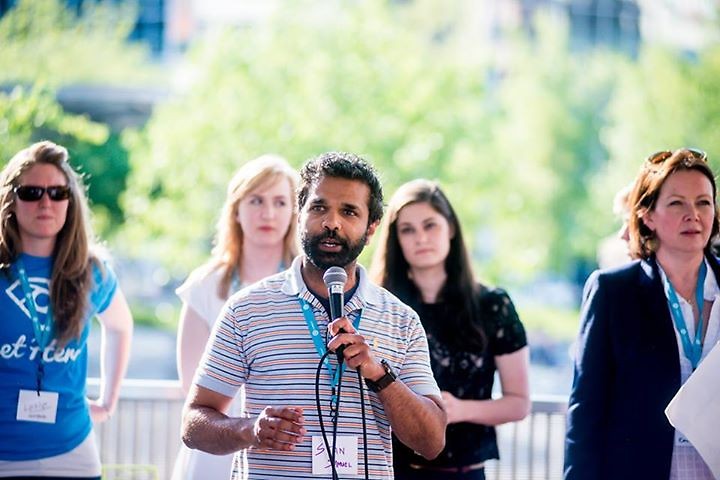Written by Felip Ballesteros, Startup Communicator at GR Current
Working within the startup community in Grand Rapids, at GR Current we’re deciphering the DNA of local entrepreneurs and investors. Identifying risk tolerance, industry strengths and core values help us structure an identity profile. In West Michigan, giving back is not just something nice to do; it’s something that we as a community just do. And we do it a lot.
Along with the startup community, we're working with others as well on what's called "impact investing." There’s a fair amount of confusion about what impact investing actually represents. Is it investment, philanthropy or both? Simply put, impact investing is the disbursement of capital expecting a financial return, but the success of the investment is also dependent upon achieving a social goal. If the investment is not successful in reaching both goals, then it’s not considered a successful investment. Simply, impact investing is an innovative way for socially conscious individuals and organizations to invest their capital to improve their communities, while earning a return that meets their financial goals.
Take Goodwill Industries, for example, whose mission is to enhance the dignity and quality of life of individuals by helping people through the “power of work.” It's no surprise that they have decided to headquarter in Grand Rapids. In 2013, their operation of gently used clothing resale and employment services generated more than $5 billion in revenue. In the same period, Goodwill was able to assist over 260,000 people, the size of Grand Rapids proper, find a job. “Doing good” as part of a business model can be very profitable and socially impactful.
Making money and doing good is not a new concept, and certainly not unique to Grand Rapids, yet the two ideas seem to coexist strongly in our city. When chatting with individuals that are new to the startup life, we remind them that Grand Rapids is not Silicon Valley, and that GR Current is not Shark Tank. We take pride in building our own startup culture, unique to our strengths and values. It’s not just a sense of pride; we have to build according to our blocks, as ignoring these differences can be detrimental in building a successful company.
With this in mind, we remind individuals to think about their "exit strategy." In our culture, many business leaders know that an important part of a complete exit strategy includes building legacy, for themselves and their families, rather than just thinking about their next venture or investment.
Think of all those hospitals, concert halls, pavilions and even markets with family names on them. Legacy is part of our exit strategy, and there is a way to build legacy and profit. A few years back, Cascade Engineering, led by Fred Keller, decided to restructure his engineering firm to a B-corp model. This would allow passing his personal values onto his company after him or his family’s involvement, by decree.
It is common practice to think of exit strategies, as this helps churn new ideas and funnel more capital into the startup ecosystem. In places like Silicon Valley, the goal is to be acquired by Google or Facebook or offered a deal by competitors to stop business altogether. Not so here.
The successful exit is a rare unicorn here, but it’s not surprising, as it’s hard to be successful and hard to leave the baby you worked so hard to make. Building legacy into the way we build companies plays to our identity. And it’s being noted.
Currently, The Grand Rapids Community Foundation, in partnership with corporate partners, Local First, The Johnson Center for Philanthropy and startup incubators like GR Current, are thinking of ways to help foster impact investment in our community, with the hope that giving back to the village that helped develop successful companies is integrated into the mission of our startups. Similarly, with a younger philanthropic population, giving to endowments with a future impact scenario is no longer something that drives donors. We want impact now. Impact investment is therefore a great method to double-dip our dollars, and museums and foundations are taking note.
As we move forward in building the future of the Grand Rapids startup community, we hope to pioneer more ways to impact society and have a solid financial return. As a concept, impact investment is a relatively new form of growing startups, as data and standards are still in their infancy.
We view this as an opportunity to lead initiatives for the rest of the country to follow. With that start of our Xcelerate project, a business accelerator that focuses on hardware, software and social impact companies, we hope to strengthen the power of socially minded entrepreneurs and investors.
The future is ours to craft, and retooling in the philanthropic and investment space is here for the taking.

GR Current attendees at the Xcelerate Kickoff /Courtesy of GR Current
The Rapidian, a program of the 501(c)3 nonprofit Community Media Center, relies on the community’s support to help cover the cost of training reporters and publishing content.
We need your help.
If each of our readers and content creators who values this community platform help support its creation and maintenance, The Rapidian can continue to educate and facilitate a conversation around issues for years to come.
Please support The Rapidian and make a contribution today.
